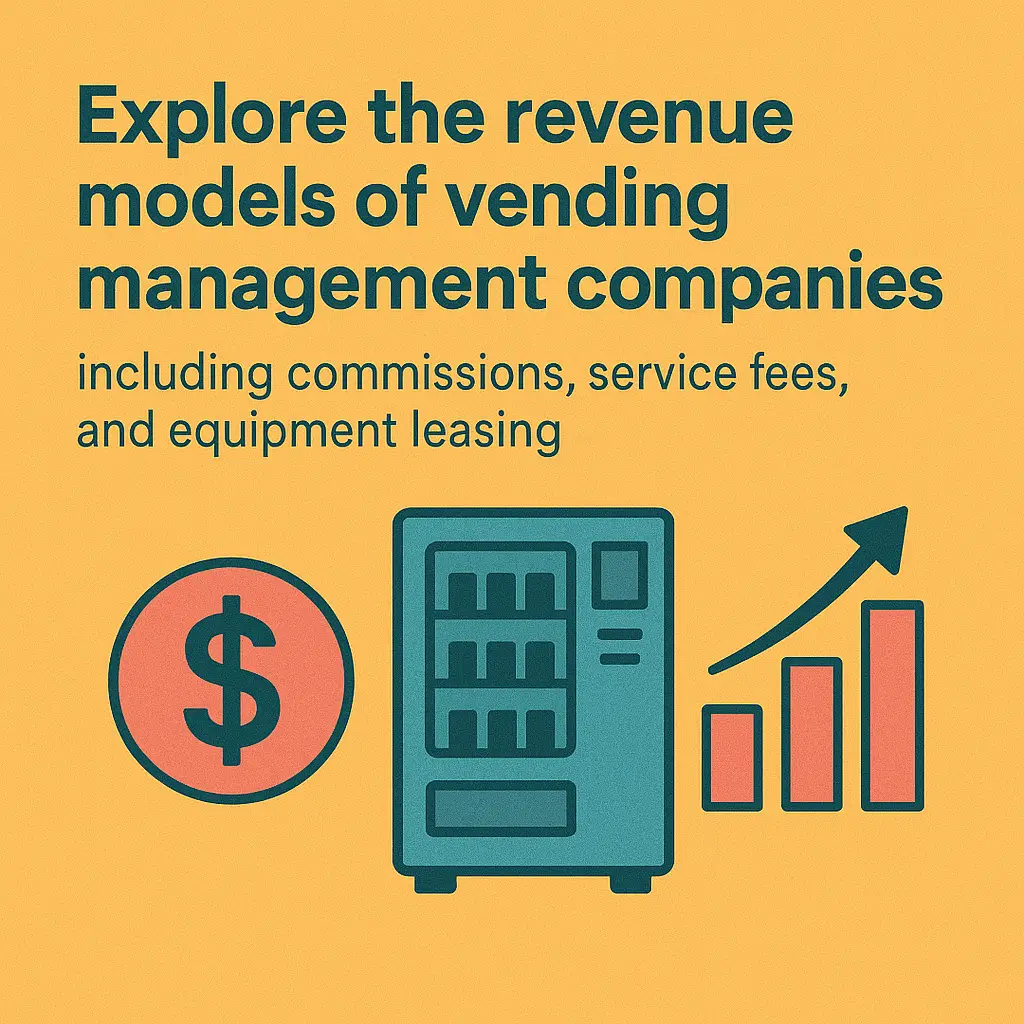How Vending Management Companies Make Money
Explore the revenue models of vending management companies, including commissions, service fees, and equipment leasing.
Back to Vending Management Companies ResourcesExplore the revenue models of vending management companies, including commissions, service fees, and equipment leasing.
Back to Vending Management Companies ResourcesRecurring revenue for management companies can come from equipment leasing, service contracts, and long-term commission agreements with vending operators and supported locations. These recurring income models ensure consistent profitability while simplifying service delivery.
![]() Management companies earn revenue through vendor commissions and service fees
Management companies earn revenue through vendor commissions and service fees
![]() Leasing vending equipment provides recurring income for management firms
Leasing vending equipment provides recurring income for management firms
![]() Profits often come from coordinating reliable vending services at scale
Profits often come from coordinating reliable vending services at scale

Vending management companies act as intermediaries between businesses looking for vending services and the local vendors that fulfill those needs. These management firms earn money through a variety of revenue channels, often depending on the scale and structure of the relationship with vendors and location partners.
One of the primary ways vending management companies make money is through commissions. Typically, these companies take a percentage of the revenue generated by vending machines placed at client locations. This commission is paid by the vending vendor, not the hosting business, and it compensates the management company for facilitating the connection and oversight.
Another common revenue stream is service fees. Some management companies may charge ongoing fees to vending operators in exchange for services like vendor vetting, performance monitoring, machine servicing, and detailed reporting. In managed service agreements, the vending management company may take full responsibility for maintenance, product restocking, and machine performance, ensuring seamless operation while keeping a portion of profits.
Equipment leasing is an additional income source. In cases where businesses do not want to purchase equipment outright, the vending management company may lease machines to vendors or directly to client locations. This generates steady monthly revenue while giving clients access to state-of-the-art vending solutions without large upfront costs.
In more premium environments, such as hospitality settings or tech-forward workplaces, vending management teams may earn revenue through custom branding, data analytics add-ons, or smart vending technology integration. These enhanced services add value for the client and additional margin for the coordinator.
Ultimately, the business model of vending management companies is built on providing reliable service, minimizing downtime, and maximizing vending performance across a network of locations and operators. This model not only improves service for businesses but also strengthens vendor accountability and machine uptime.
For example, learn how custom-branded options in hotels can provide higher margins or how selecting the right eco-friendly breakroom services improves engagement and retention.
If you're exploring vending options for your business, Vending Exchange can help simplify the process. Delivery, Installation and Equipment is provided at no cost to you - vendors provide the machines, keep them stocked, and handle all servicing. Whether you need a provider or full-service management, just fill out the form on this page to get started.
Typically, vending management companies earn money from vending vendors, not the host business. They may take a percentage of machine sales as commission or charge service fees to vendors for ongoing support and oversight.
Reputable management companies are transparent about earnings. Businesses usually do not pay out-of-pocket costs, since revenue is earned through vendor partnerships and commissions.
Some vending management firms own the vending machines and lease them to vendors or client locations. They earn monthly lease payments as part of a recurring revenue stream.
Vendors pay for access to qualified, high-traffic locations and ongoing contract management. These relationships improve vendor earnings while streamlining service for businesses.
A percentage of vending machine sales is paid by the vendor to the management company. This percentage varies depending on the agreement but is a core revenue stream for most management companies.
Yes. For qualifying locations, vending management companies provide equipment, delivery, and maintenance at no cost. Their income comes from commissions paid by vendors.
Yes. Part of a management company’s value is vetting and replacing underperforming vendors to maintain reliable service at client sites.
In many cases, yes. These agreements offer consistent control over product quality and uptime, allowing management companies to retain a larger share of profits in exchange for full oversight.
Yes. Many vending management companies increase revenue by coordinating premium setups like micro markets and smart coolers in modern facilities.
Smart vending tech can increase machine sales through features like contactless payments and inventory tracking—resulting in higher vendor revenue and larger commissions for management firms.